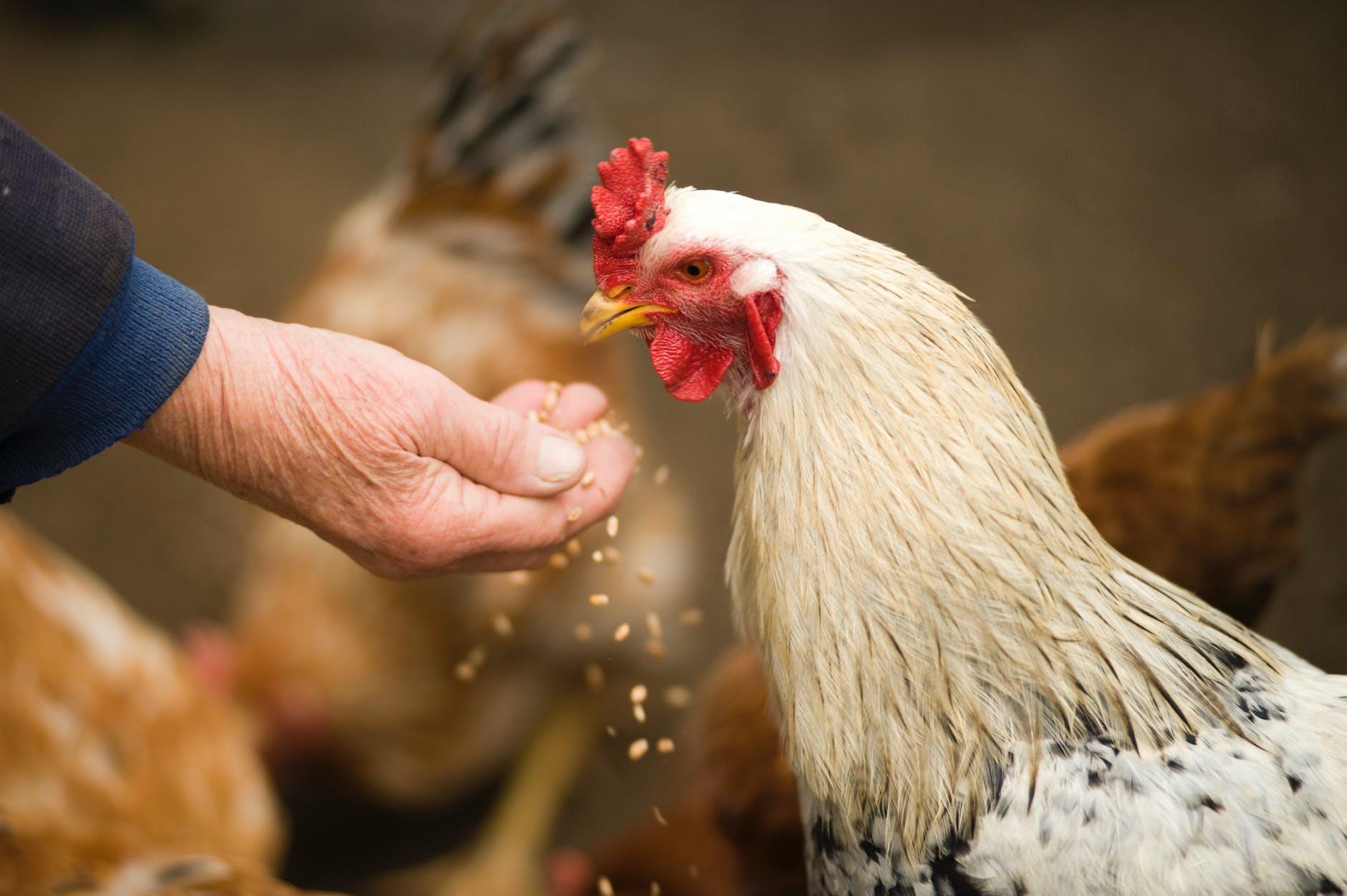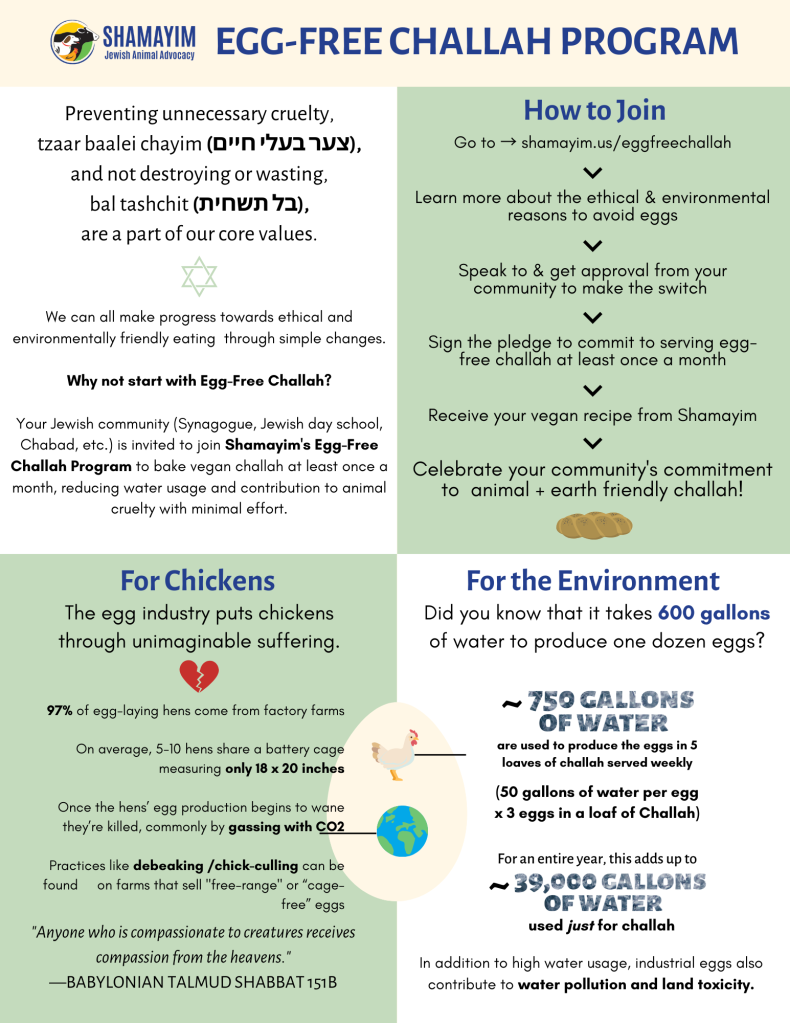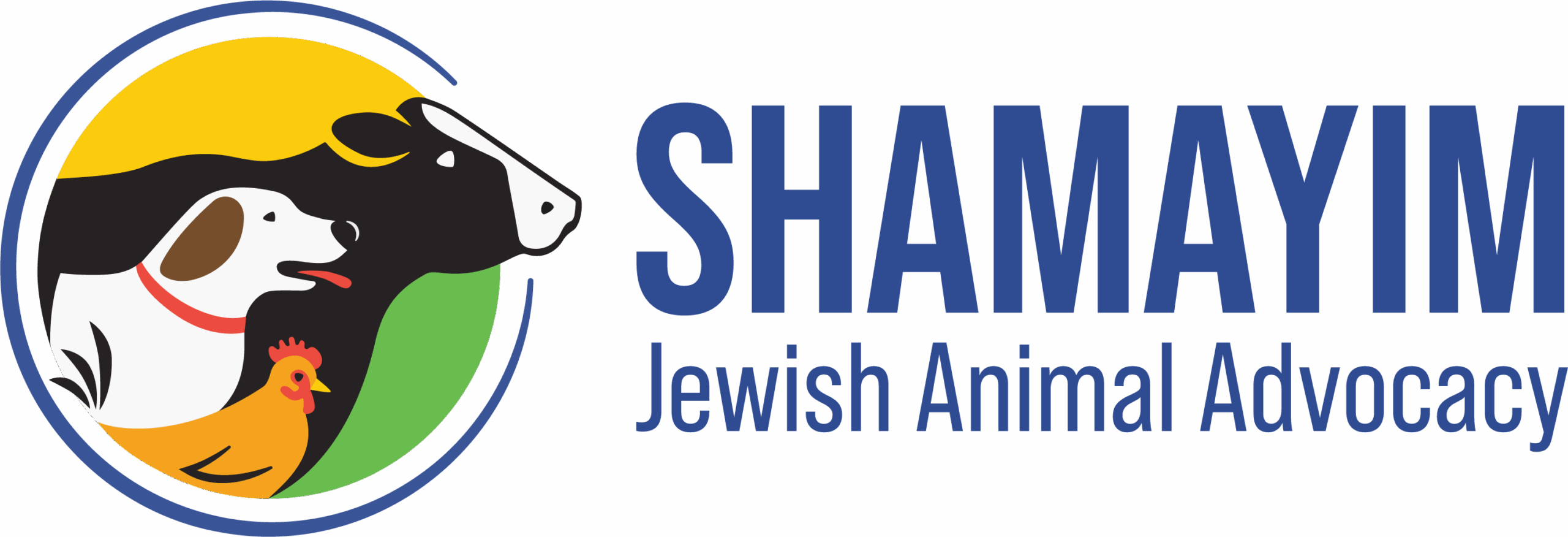Egg- Free Challah

Through our Egg-Free Challah Program, you can commit your synagogue, Hillel, or other community organization to baking vegan challah at least once a month, reducing both water usage and reliance on animal products with minimal effort.

Preventing unnecessary cruelty, tza’ar ba’alei chayim (צער בעלי חיים), and not destroying or wasting, bal tashchit (בל תשחית), are two core Jewish values. But the industrial egg industry puts chickens through unimaginable suffering and uses large amounts of precious resources to produce their product.
WE CAN ALL MAKE PROGRESS TOWARDS ETHICAL AND ENVIRONMENTALLY FRIENDLY EATING THROUGH SIMPLE CHANGES. WHY NOT START WITH EGG-FREE CHALLAH?
To join, speak to your community about making the commitment to egg-free challah, and then sign our pledge below.
We’ll contact you with a simple and delicious vegan recipe to use, and provide additional resources for your community to learn about more ethical and environmentally friendly ways of eating.
Please email info@shamayim.us if you have any questions.
Make the Pledge for Egg-Free Challah
HOW DO EGGS HARM CHICKENS?
Hundreds of millions of chickens in the egg industry suffer throughout their lives. Male chicks, considered a byproduct since they can not lay eggs, are killed by gassing or shredding soon after they hatch, a process also known as “culling”. In the U.S. alone, more than 260 million male chicks are killed in the egg industry every year. For the females, the industry practices “beak trimming” with a hot blade to prevent them from developing the abnormal pecking behaviors that manifest in their living environments.
On a typical factory-farm (where about 97% of eggs come from), each caged laying hen is afforded only 67 square inches of space in a battery cage, less room than a letter-sized piece of paper. Most hens spend their entire lives in a cage so small, they can’t even spread their wings. Battery cages prevent nearly all normal behavior, including nesting, perching, and dustbathing, all of which are critically important to hens, as well as deny the birds normal movement to such an extent that the hens may suffer from physical ailments, including osteoporosis and reproductive and liver problems. Laying hens are among the most intensively confined animals in the animal agriculture business.
Once the hens’ egg production begins to wane after one-two years of living in these stressful conditions, they’re harshly removed from their cages, often resulting in broken bones. They are then killed, commonly by gassing with CO2 at the farm or by transporting them to slaughter where they experience further stress and trauma associated with shackling, electrical water-bath stunning, and throat-cutting.
While “free-range”/”cage-free” eggs are a slight improvement in animal welfare, there is very loose regulation around these terms. According to the USDA, free-range means the birds must have access to the outdoors for an undetermined period each day. This can mean a hen spends her life crowded in a space with tens of thousands of birds in a windowless, warehouse-style shed, with just a small door opened to the outside sometimes not even accessible to all of the birds. Practices like “beak trimming” and “chick culling” are found on industrial farms that sell these higher welfare eggs.
HOW DO EGGS HARM THE ENVIRONMENT?
Eggs are not the most environmentally-friendly foods either. Did you know that it takes roughly 600 gallons of water to produce one dozen eggs? (50 gallons per egg) For animal-sourced foods like eggs, the water needed to produce the product is much high than plant-based foods since the feed going to the animals count towards the water footprint. Most of the water required for eggs comes from feeding the chickens, which is typically a soy or corn-based feed. To put it into perspective:
If your congregation baked 5 loaves of challah every Shabbat and used 3 eggs in each loaf, that adds up to 750 gallons of water a week, or 39,000 gallons of water per year just for the eggs used in Challah.
COMMUNITIES THAT HAVE COMMITTED TO EGG-FREE CHALLAH
Temple Beth Tikvah – Roswell, Georgia
Washington and Lee University Hillel – Lexington, Virginia
Congregation Bonai Shalom – Boulder, Colorado
Temple Beth Sholom of the East Valley – Chandler, Arizona
IKAR – Los Angeles, California
Oregon State Hillel – Corvallis, Oregon
Middlebury Hillel – Middlebury, Vermont
Greens Inspired Pod Group – California
Y @ Home Washington Heights & Inwood – New York
Chadeish Yameinu Jewish Renewal of Santa Cruz – California
INDIVIDUALS THAT HAVE COMMITTED TO EGG-FREE CHALLAH
Sari Allen
Bela Fidel
Sandra Lilienthal
The Gross Family
